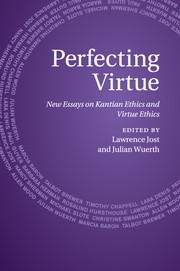Book contents
- Frontmatter
- Contents
- Notes on contributors
- Acknowledgements
- List of abbreviations
- Introduction
- 1 Virtue ethics in relation to Kantian ethics: an opinionated overview and commentary
- 2 What does the Aristotelian phronimos know?
- 3 Kant and agent-oriented ethics
- 4 The difference that ends make
- 5 Two pictures of practical thinking
- 6 Moving beyond Kant's account of agency in the Grounding
- 7 A Kantian conception of human flourishing
- 8 Kantian perfectionism
- 9 Aristotle, the Stoics, and Kant on anger
- 10 Kant's impartial virtues of love
- 11 The problem we all have with deontology
- 12 Intuition, system, and the “paradox” of deontology
- Bibliography
- Index
7 - A Kantian conception of human flourishing
Published online by Cambridge University Press: 04 February 2011
- Frontmatter
- Contents
- Notes on contributors
- Acknowledgements
- List of abbreviations
- Introduction
- 1 Virtue ethics in relation to Kantian ethics: an opinionated overview and commentary
- 2 What does the Aristotelian phronimos know?
- 3 Kant and agent-oriented ethics
- 4 The difference that ends make
- 5 Two pictures of practical thinking
- 6 Moving beyond Kant's account of agency in the Grounding
- 7 A Kantian conception of human flourishing
- 8 Kantian perfectionism
- 9 Aristotle, the Stoics, and Kant on anger
- 10 Kant's impartial virtues of love
- 11 The problem we all have with deontology
- 12 Intuition, system, and the “paradox” of deontology
- Bibliography
- Index
Summary
For many of us, the most engaging moral questions are not about rights or what makes acts right, but about what sort of person to be and how to live – questions more usually associated with virtue ethics than with Kantian ethics. In this essay, I focus on a central feature of eudaimonistic virtue ethics generally regarded as absent from Kant's ethical theory: a conception of human flourishing. I argue that Kant's ethics contains a conception of human flourishing, with Kant's highest good providing its structure and an abstract account of its content, and his doctrine of duties filling out this conception and pointing agents toward its approximation. The conception of flourishing that emerges is distinctively Kantian, though latent in Kant's work: it is clearly grounded in important aspects of Kant's moral thought, but is not presented by Kant as a conception of human flourishing. The construction of this conception from Kant's work is worthwhile both because it illuminates important strands of his thought and their relations to one another (and so enriches our understanding of Kant's ethics), and because it provides compelling, characteristically Kantian answers to deep, enduring questions about how to live and what sort of person to strive to be (and so enhances the appeal of Kantian ethics).
Section i sets out basic features of an Aristotelian account of human flourishing, highlights attractive elements of it, discusses why we cannot attribute an Aristotelian eudaimonism to Kant, and offers criteria for a Kantian conception of human flourishing.
Keywords
- Type
- Chapter
- Information
- Perfecting VirtueNew Essays on Kantian Ethics and Virtue Ethics, pp. 164 - 193Publisher: Cambridge University PressPrint publication year: 2011
- 13
- Cited by

